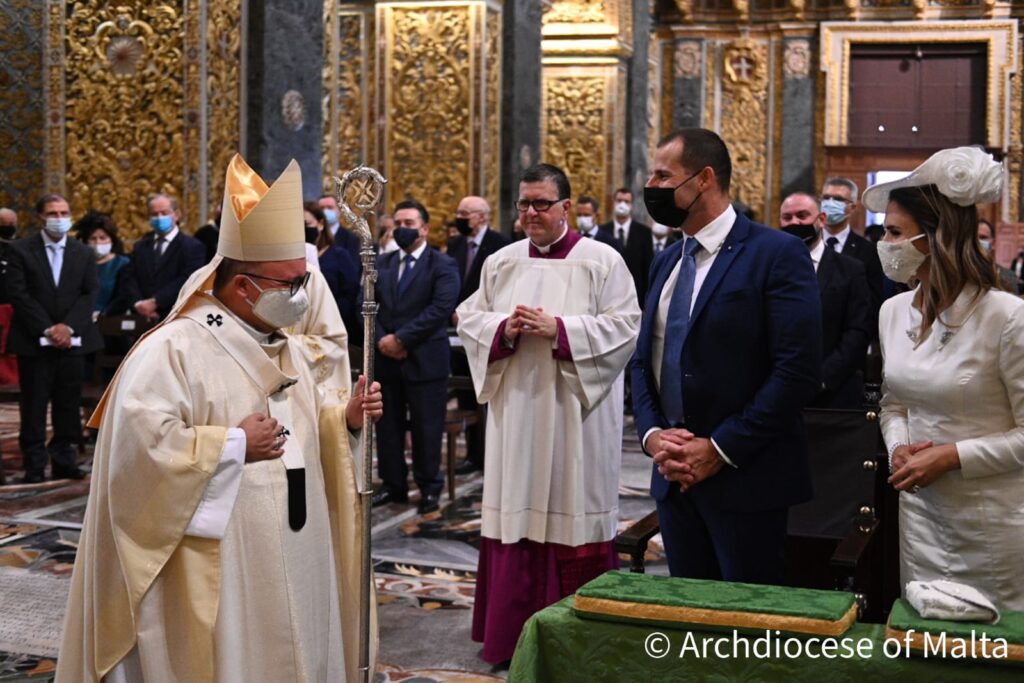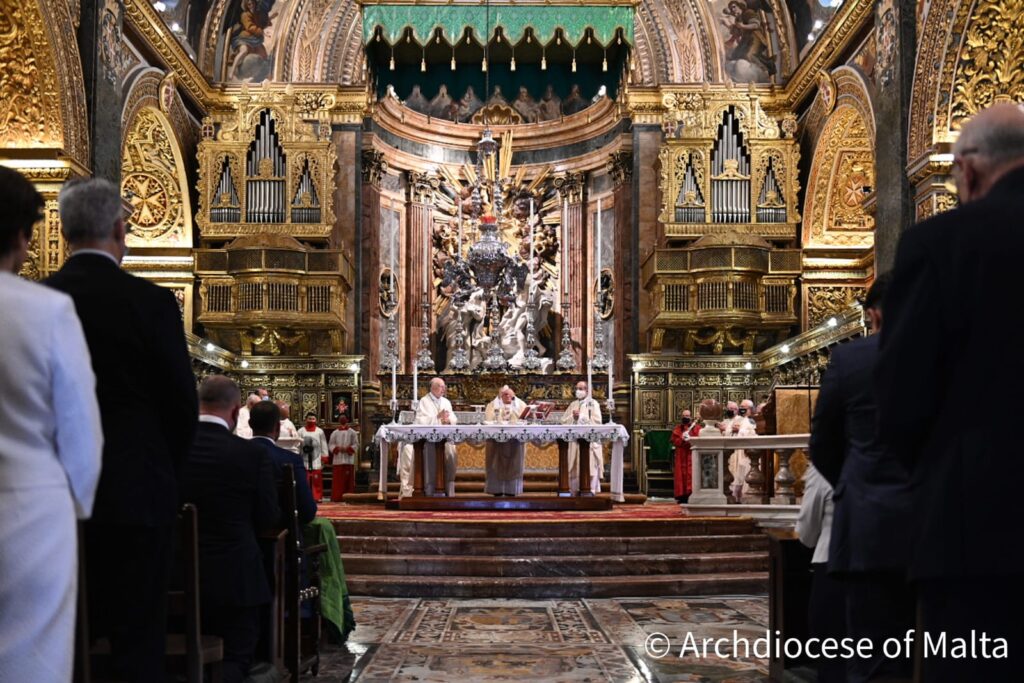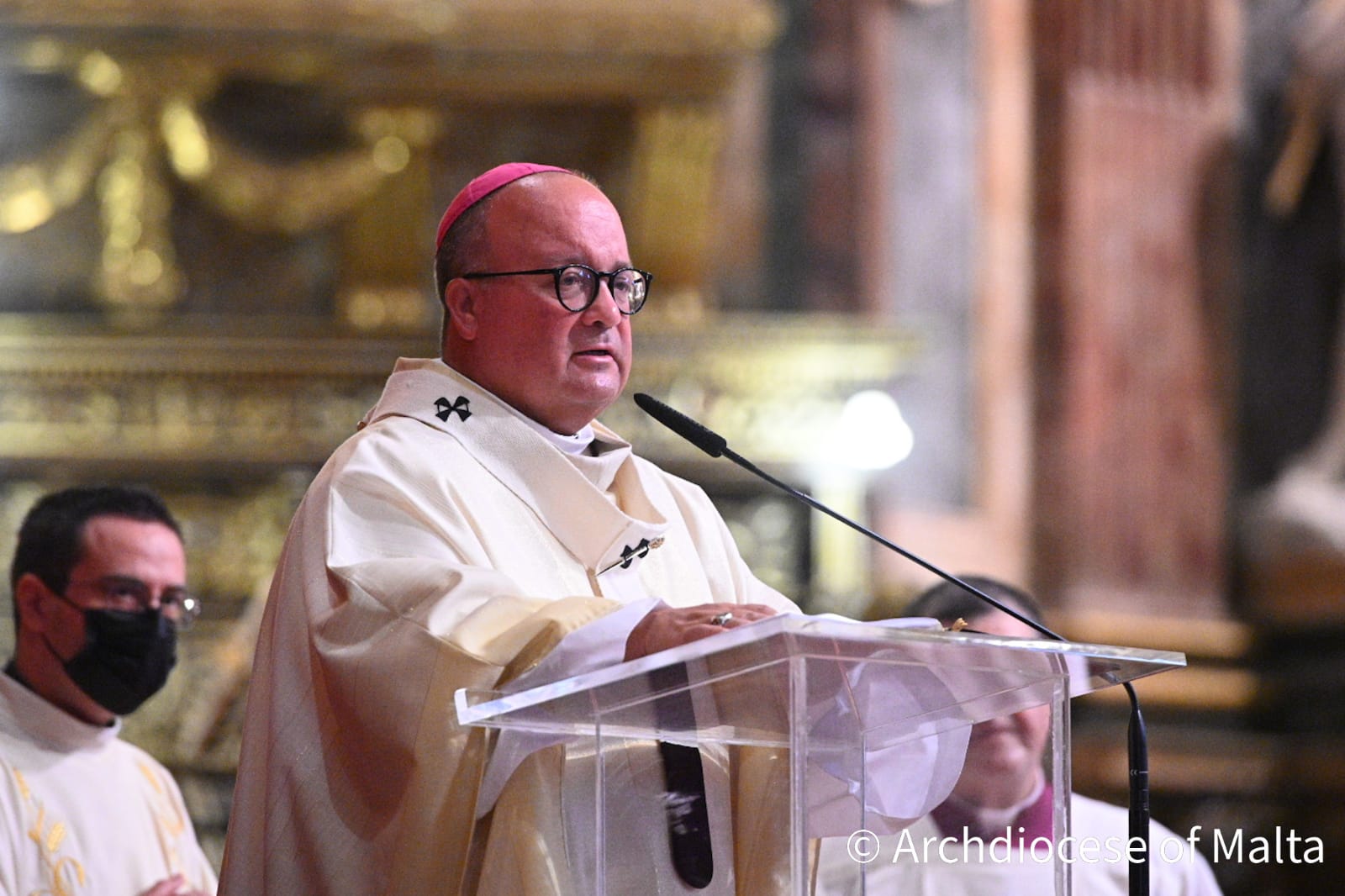Homily by Archbishop Charles Jude Scicluna
The passage from the First Letter of Saint Paul the Apostle to Timothy from today’s first reading, is particularly relevant to us Maltese and Gozitans as we celebrate this anniversary of Independence Day 2021. In this passage, Saint Paul addresses his disciple who was chosen to be the leader, the head of a community. He was a young man filled with enthusiasm. Saint Paul the Apostle, our Father in faith, exhorts him to set an example and avoid the pitfalls present in the path of a shepherd, of a person responsible for a community.
At a point, Saint Paul observes the Christian community and realises that those members who set aside the words of truth succumb to a disease which brings about disputes and language that only results in envy and hostility, oppression and mistrust. The word of truth instils in the disciple and in the leader, sentiments of justice, goodness, faith, love, patience and kindness. These are values that are required in any sovereign state, including our State that gained its sovereignty in 1964.
Saint Paul the Apostle, our Father in faith, puts his finger on a present-day wound that I feel morally obliged to address in my short exhortation today. He tells us: ‘there is great gain in piety combined with contentment’ (1Tim 6:6). It would be appropriate for us to stop and reflect upon these words by Saint Paul, as in the word ‘piety’ or ‘godliness’ I would include not only pietas, that is an attitude of devotion towards God, the Creator of all things and all beings, but would also include self-control and justice that are the basis for social harmony. In this respect, piety, that also incorporates social justice, has great gain. However, Saint Paul clearly says that it has great gain for those who are content with what they have, ‘for we brought nothing into the world, so that we can take nothing out of it; but if we have food and clothing, we will be content with these. But those who want to be rich fall into temptation and are trapped by many senseless and harmful desires that plunge people into ruin and destruction. For the love of money is a root of all kinds of evil, and in their eagerness to be rich some have wandered away from the faith and pierced themselves with many pains’ (1Tim 6:7-10).

We need not mention recent events to understand that these words by Saint Paul are filled with wisdom and truth. One of the diseases that is spreading in Maltese society is greed. Greed is an expression of extreme individualism: if I am satisfied then I do not care about anybody else. But those who are content with what they have, those who eat their daily bread with gratitude because it was earned by their hard work, with a pure heart, a clear conscience and a great sense of justice, not only will they have enough but they would also have given a valuable contribution to society.
One of the symptoms of greed is the uglification of the Maltese landscape. Is it necessary to tarnish the beauty of our country for a few bucks? Aren’t we capable of controlling our desire for new projects and combining this with wisdom and prudence to create buildings and projects that are aesthetically pleasing and that are in keeping with our country’s typical landscape? Isn’t this the heritage that we received? If we look around us at the city of Mdina, the bastions of Valletta and Cottonera, we do not only see functional buildings but also harmonious and captivating architecture. Can we say the same thing about the buildings through which we are destroying the sense of beauty in our country? Isn’t this a sign of greed, especially when we are building not necessarily to provide homes but simply to make more money. Some call this progress; but at what cost? Many times, as Saint Paul says, if we fall into temptation and are trapped by greed, we end up not only depriving ourselves and our children of the quality of life that we deserve, but we will also be depriving future generations.
One of the symptoms of greed is the uglification of the Maltese landscape. Is it necessary to tarnish the beauty of our country for a few bucks?
We are all eager for Malta’s reputation to always be one that we are proud of. However, before blaming others and their harsh judgement, we ought to stop and examine our conscience. Is the craving for money, easy money, also destroying the moral backbone of our country? And what kind of independence are we celebrating if we are slaves ofthe craving for power and greed for money? These are egoistic traits that do not give us freedom, and if we are celebrating our independence and the freedom of our country from all colonial and military conditioning, we need to stop and think: have we succumbed to some form of slavery, the slavery of our own greed for power or money?

My last reflection is on the passage from the Gospel of Saint Luke. Jesus travels to towns and villages preaching and proclaiming the Gospel, the Good News of the Kingdom of God. He is not alone: he asks the twelve apostles to accompany him and he also asks some women to do the same. These women, through their experience of Jesus, were touched by healing from evil spirits and sickness. They came from various sectors of society: Mary of Magdala from a fishermen’s village – seven spirits were delivered from her; there was also Johanna, a woman who was closely related to power; she was the wife of Chuza, Herod’s procurator – his minister of finance so to say. It is ironic that without knowing, it is very likely that Herod was also subsidising the Lord’s mission through Johanna. Then there was also Susanna, whose name is cherished in scripture as it reminds us of the passage in the book of Daniel where a faithful, pure Jewish woman is accused unjustly by corrupt judges and Daniel frees her through the power of the wisdom sent by God. There were many others and they all served from their own wealth.
On Independence Day 2021, we ought to ask ourselves: does money control me or do I use it for the good of others?
Saint Paul’s words do not condemn the economy, finance or all that symbolises progress or economic wealth. Ultimately, the passage from the Gospel of Saint Luke teaches us that Jesus also had his own fundraisers – those who helped and served him from their own wealth. But today, on Independence Day 2021, we ought to ask ourselves: does money control me or do I use it for the good of others? I would like to take this opportunity to thank the Maltese State that, since the Second World War and especially since gaining independence, is a State that cherishes social services, social welfare, assistance to the poor and vulnerable, free health services and education. All that contributes towards the common good clearly demonstrates how a State ought to be. My word is therefore one of encouragement and appreciation for all the good that takes place. May the words of Saint Paul the Apostle, our Father in faith, words of love but also words of warning, grant us wisdom and be of benefit to us all.
✠ Charles Jude Scicluna
Archbishop of Malta
Mass Readings:
Reading I: 1 Tim 6, 2c-12
Psalm: 48 (49), 6-7.8-10.17-18.19-20
Gospel: Lk 8, 1-3






